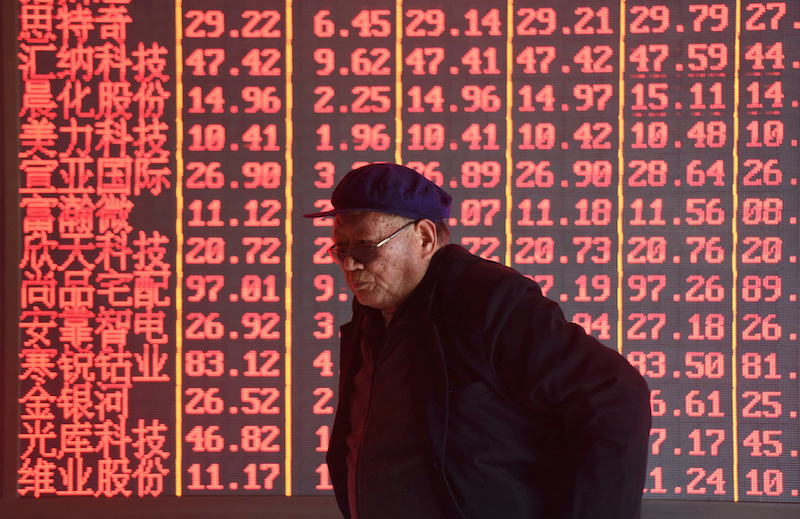Asian indexes shifted back into reverse on Wednesday as optimism over the economic picture in the US and China’s emergence from its Covid nightmare faded.
Warnings from big US banks about a likely recession next year pushed the S&P 500 lower for a fourth straight session on Tuesday applying the brakes on a rally that has lasted almost two months.
And hopes that China’s moves to roll back some of its economically painful Covid curbs might boost its recovery were dashed with markets predicting a difficult winter ahead when cases surge again.
Also on AF: Foxconn Says Covid-Hit China iPhone Plant Back on Track
Japan’s Nikkei share average touched a four-week low, tracking the tech-led sell-off on Wall Street overnight, although gains in auto stocks helped cap losses.
The benchmark Nikkei 225 index dropped 0.72%, or 199.47 points to end at 27,686.40. The broader Topix index fell 0.10%, or 1.91 points, to 1,948.31.
Chipmaking equipment company Tokyo Electron was both the biggest percentage and points decliner, with its 3.78% decline shaving 60 points off the Nikkei.
Automakers gained as the yen stabilised near 137 per dollar, retreating from its strongest level since mid-August last week, bolstering the value of overseas revenue.
China’s national health authority said on Wednesday that asymptomatic Covid-19 cases and those with mild symptoms can now self-treat while in quarantine at home.
While some of the changes announced echoed similar easing moves made by other countries many months ago, the announcement was the strongest sign so far that China is preparing its people to live with the disease after nearly three years of crippling restrictions that have battered the economy.
Markets Muted on China Hopes
Market reaction, however, was muted as the focus shifts to how well China can execute its policy shift, especially if new Covid cases surge over winter. Analysts say the path to fully reopening the economy will be long and bumpy, and not without risk.
Adding to the darkening demand outlook globally, China earlier in the day reported grim trade data for November, with both imports and exports suffering their biggest monthly falls since 2020.
The Hang Seng Index dropped 3.22%, or 626.36 points, to 18,814.82, hauled down by its tech stocks and the gloomy global picture.
The Shanghai Composite Index dipped 0.40%, or 12.91 points, to 3,199.62, while the Shenzhen Composite Index on China’s second exchange rose 0.15%, or 3.11 points, to 2,071.04.
MSCI’s broadest index of Asia-Pacific shares outside Japan fell 0.2%. Indian stocks were down too with Mumbai’s signature Nifty 50 index slipping 0.44%, or 82.25 points, to close at 18,560.50.
US Banks Downbeat on 2023
In the United States, big banks are bracing for a worsening economy next year as inflation and rate rises threaten consumer demand, with top executives at Goldman Sachs, JPMorgan and Bank of America all sounding downbeat in remarks on Tuesday.
“Economic growth is slowing,” said Goldman Sachs CEO David Solomon. “When I talk to our clients, they sound extremely cautious.”
The growth fears rallied longer-dated bonds and helped the safe-haven US dollar to pause its recent retreat.
The yield on benchmark 10-year US Treasuries fell 8.6 basis points to 3.513 per cent overnight and was last at 3.5460%. That is more than 80 bps below the two-year yield as investors reckon on high rates hurting growth.
Oil also fell sharply and, with Brent futures at US$79.50 a barrel, is back where it began the year.
Crude has been sliding with declining demand expectations and now sits more than 40% below a high of nearly US$140 a barrel made shortly after Russia’s invasion of Ukraine on Feb 24.
In foreign exchange markets, the US dollar was seeking to steady after excitement about a slowdown in US rate hikes recently knocked it from the year’s highs. It was firm at 137.28 yen in Asia on Wednesday and traded at US$1.0467 per euro.
Spot gold was steady at US$1,773 an ounce, and Bitcoin, at $17,000, was going nowhere with cryptocurrency sentiment fragile as the fallout from the collapse of FTX ripples through the sector.
Key figures
Tokyo – Nikkei 225 < DOWN 0.72% at 27,686.40 (close)
Hong Kong – Hang Seng Index < DOWN 3.22% at 18,814.82 (close)
Shanghai – Composite < DOWN 0.40% at 3,199.62 (close)
London – FTSE 100 < DOWN 0.10% at 7,513.98 (1000 GMT)
New York – Dow < DOWN 1.03% at 33,596.34 (Tuesday close)
- Reuters with additional editing by Sean O’Meara
Read more:
China’s Trade Slumps to Lowest Levels in Over Two Years
Asia Braces for Wall St Shockwave as Banks’ Fears Deepen
China Makes Most Sweeping Changes Yet to Anti-Covid Policy























